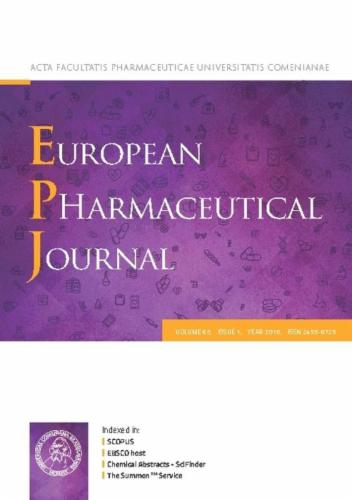Modulation of FOXO3a Nuclear Localization by Linagliptin (BI-1356) Reveals a New Therapeutic Target in Chronic Ulcerative Colitis
IF 4.3
3区 医学
Q1 PHARMACOLOGY & PHARMACY
引用次数: 0
Abstract
Globally, the incidence and prevalence rates of ulcerative colitis (UC) show a rising pattern. The limited efficacy and significant adverse effects associated with current treatment options underscore the need for novel therapeutic approaches. It has been found that linagliptin, a dipeptidyl peptidase-4 inhibitor, activates AMPK in different disease conditions. The main objective of the present work was to elucidate the potential implications of the AMPK/FOXO3a mediated by linagliptin in rats with chronic colitis. The findings of the current report revealed the first robust in-vivo evidence advocating the coloprotective effect of linagliptin against dextran sodium sulfate-induced chronic UC in rats. It has demonstrated potential beyond its antidiabetic effects by modulating FOXO3a localization. By shifting FOXO3a from the cytosol to the nucleus, linagliptin enhanced the transcription of genes involved in attenuation of pro-inflammatory events and restoration of redox homeostasis. Nuclear FOXO3a also impacted NFκB activity, reducing inflammation. This conclusion was fundamentally supported by the documented improvements in histopathological changes evidenced by reduced inflammation, edema, crypt atrophy, and submucosal fibrosis. Moreover, decreased colon weight/length ratio, as well as reduced scores of disease activity and macroscopic damage indices, were observed. Furthermore, it corrected body weight loss during the time frame of the experiment. These findings underscore the anti-inflammatory potential of therapies that promote the nuclear localization of FOXO3a in inflammatory conditions. Linagliptin's ability to modulate FOXO3a localization might be particularly useful for diabetic patients suffering from inflammatory bowel diseases. However, further molecular investigations are required to validate the findings and to assess the clinical application of this approach as a valid tool for alleviating UC.
利格列汀(BI-1356)调节FOXO3a核定位揭示慢性溃疡性结肠炎的新治疗靶点
在全球范围内,溃疡性结肠炎(UC)的发病率和患病率呈上升趋势。目前的治疗方案有限的疗效和显著的不良反应强调需要新的治疗方法。已经发现利格列汀,一种二肽基肽酶-4抑制剂,在不同的疾病条件下激活AMPK。本研究的主要目的是阐明利格列汀介导的AMPK/FOXO3a对慢性结肠炎大鼠的潜在影响。本报告的研究结果首次揭示了利格列汀对葡聚糖硫酸钠诱导的大鼠慢性UC的结肠保护作用的有力体内证据。通过调节FOXO3a的定位,它已被证明具有潜在的抗糖尿病作用。利格列汀通过将FOXO3a从细胞质转移到细胞核,增强了参与抑制促炎事件和恢复氧化还原稳态的基因的转录。核FOXO3a也影响NFκB活性,减少炎症。这一结论从根本上得到了组织病理学改变的改善的支持,证明了炎症、水肿、隐窝萎缩和粘膜下纤维化的减少。此外,观察到结肠重量/长度比降低,疾病活动性评分和宏观损伤指数降低。此外,它还纠正了实验期间的体重下降。这些发现强调了在炎症条件下促进FOXO3a核定位的治疗的抗炎潜力。利格列汀调节FOXO3a定位的能力可能对患有炎症性肠病的糖尿病患者特别有用。然而,需要进一步的分子研究来验证这些发现,并评估该方法作为缓解UC的有效工具的临床应用。
本文章由计算机程序翻译,如有差异,请以英文原文为准。
求助全文
约1分钟内获得全文
求助全文
来源期刊
CiteScore
9.60
自引率
2.20%
发文量
248
审稿时长
50 days
期刊介绍:
The journal publishes research articles, review articles and scientific commentaries on all aspects of the pharmaceutical sciences with emphasis on conceptual novelty and scientific quality. The Editors welcome articles in this multidisciplinary field, with a focus on topics relevant for drug discovery and development.
More specifically, the Journal publishes reports on medicinal chemistry, pharmacology, drug absorption and metabolism, pharmacokinetics and pharmacodynamics, pharmaceutical and biomedical analysis, drug delivery (including gene delivery), drug targeting, pharmaceutical technology, pharmaceutical biotechnology and clinical drug evaluation. The journal will typically not give priority to manuscripts focusing primarily on organic synthesis, natural products, adaptation of analytical approaches, or discussions pertaining to drug policy making.
Scientific commentaries and review articles are generally by invitation only or by consent of the Editors. Proceedings of scientific meetings may be published as special issues or supplements to the Journal.

 求助内容:
求助内容: 应助结果提醒方式:
应助结果提醒方式:


